President Barack Obama has made it clear that a nuclear deal with Iran is one of his top priorities this year. Disarmament has, in fact, been the only constant in his foreign policy, not just since taking office in 2009 but since his college days at Columbia. Yet as negotiations have broken one deadline after another, America’s allies–especially Israel and Saudi Arabia–have become alarmed, fearing a weak deal that will leave Iran on the cusp of nuclear armament. Five key foreign policy blunders reinforced those fears.
1. From “regime change” to “regional power.” Obama came to office rejecting any foreign policy idea that George W. Bush might have embraced. That included “regime change”–a concept the Bush administration also rejected, ironically, until the 9/11 attacks reshaped its priorities. Obama did nothing to help the Green Revolution in 2009; worse, he casts Iran as future “regional power” in what he calls a “new equilibrium” in the region. It is not clear where Iran’s interests end, and Obama’s interests begin.
2. The Syria “red line” that wasn’t. Few foreign policy blunders have been as momentous as Obama’s 2012 warning that Syria would face military consequences if it crossed the “red line” of using chemical weapons. When Syria did so, Obama did nothing, and only Russian diplomatic intervention–which effectively preserved the Assad regime, with tacit U.S. approval–allowed the White House to save face. America’s enemies–and our allies–took careful note of Obama’s lack of commitment.
3. The one-sided Cuba deal. President Obama’s surprise announcement of “normalization” with Cuba caused some to hope that new links to the island might help liberalize the communist regime. Yet Obama gave away major concessions to the Castro regime for nothing in return. By its own admission, for example, the White House has no way of monitoring whether Cuba is actually living up to assurances that it would free several dozen political prisoners. Obama also ignored Congress entirely.
4. The loss of Crimea and the failed Russian “reset.” Obama was determined to “reset” relations with Russia–as if the decline, especially following Russia’s invasion of Georgia in 2008, had been Bush’s fault. In the process, he gave up American missile defense plans, made one-sided concessions on nuclear weapons, and betrayed allies in Eastern Europe. When Russian invaded and annexed Crimea, Obama did little to respond. Russia may be reeling from low oil prices, but not from U.S. policy.
5. The North Korean hack. The idea that North Korea–possibly with Chinese help, and a mole on the inside–was able to hack a major company and terrorize the country for days suggests that the Obama administration is not taking its basic defense responsibilities seriously. That perception was reinforced by Obama’s attempt to shift responsibility to Sony. Alternatively, new theories that suggest North Korean may not have been involved after all cast doubt on the competence of U.S. intelligence.
6. The abandonment of Iraq, Afghanistan, and Libya. The U.S. presence in Iran and Afghanistan may have been both costly and controversial, but it allowed America to exert major pressure on Iran. Now, too-rapid withdrawals–undertaken for purely domestic political reasons–have allowed ISIS to flourish, the Taliban to advance, and the Iranians to consolidate. The post-Ghadafi debacle in Libya, including the Benghazi attacks, suggest Obama is not serious about American power abroad.
7. The squeeze on Israel. From day one, Obama has pursued a misguided policy of pressuring Israel to make concessions to the Palestinians. Despite occasional gestures of friendship–such as defending Israel at the UN, or a presidential visit–Obama has publicly downgraded relations with Israel. The low point came in the 2014 Gaza war, when the U.S. treated Israel on equal footing with Hamas terrorists and failed to resupply weapons. Small wonder that Israel anticipates betrayal on Iran.
Senior Editor-at-Large Joel B. Pollak edits Breitbart California and is the author of the new ebook, Wacko Birds: The Fall (and Rise) of the Tea Party, available for Amazon Kindle.
Follow Joel on Twitter: @joelpollak

COMMENTS
Please let us know if you're having issues with commenting.